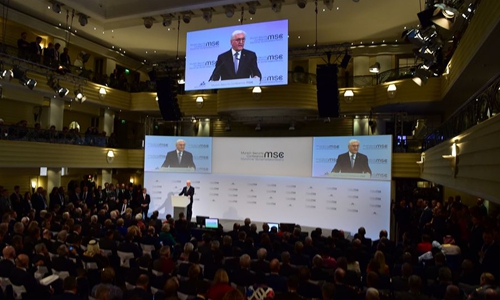Westlessness: right focus, wrong interpretation – the illness of the West and beyond

Photo:Xinhua
Is the world becoming less Western? Is the West itself becoming less Western, too? What does it mean for the world if the West leaves the stage to others? What could a joint Western strategy for an era of great power competition look like?
These are the guiding questions for the 56th Munich Security Conference (MSC). Founded in 1963 as the Euro-Atlantic venue for security dialogue, it expanded into a global forum, also called the "Davos of security and foreign policy issues." Actually, in spite of its global approach and participation, it is still a Western perspective. Not surprisingly, it is still questioning the Western role in relation to the process of international geography of power change.
This year's annual report is based on the above questions. It offers a Western-self-referential perspective. The latter can be immediately gleaned from the nature of the questions. What does it mean for the world if the West leaves the stage to others? What could a joint Western strategy for an era of great power competition look like?
Writing for example "the West leaves" means we, the West, have been driving the world, but we, the West, are less able to do so. Why? For many reasons: internal contradictions and fractures within the Euro-Atlantic region (see EU-US relations during the last few years, made up of a combination of trade wars and divergences on multiple issues, such as energy and the Middle East), and the emergence of new powers, such as China.
Another self-referential aspect comes from the title of the chapter dedicated to China. The latter is defined "Meddle Kingdom," a power that, in their words, is more proactive in international affairs (right) and is interfering in the affairs of others. Partially right, partially hilarious.
Are Western powers respectful of other countries' policies? Not at all. Why? Because the West suffers a great illness, thinking it is a superior culture.
The West still thinks, undemocratically, it is the main dispenser of universal values. In fact, they write, "The West has never been a monolithic concept. Yet, for decades, the answer to the question of what it was that kept the West together was straightforward: a commitment to liberal democracy and human rights, to a market-based economy, and to international cooperation in international institutions."
Look. Always the same story. We pretend to have the right values (actually political projects of domination), the right and superior political philosophy (liberalism), and the right set of rules for humanity.
The cultural premises that you can widely find in the report are a declaration of superiority to the rest of the world. From my point the question should be, if we would apply a critical thinking approach, "how is and how was the configuration of power relations under Western guided international order?" Not so fair, not so democratic, not so human.
Going back to China. They write Chinese reaction to protracted and incendiary protests has come under scrutiny from abroad, but foreign governments have been largely noncommittal. A growing list of interventions - from manufacturing international praise for the mass internment of China's Uighurs, to arbitrarily jailing Canadians in retribution for Canada arresting a Huawei executive. These are all part of fabricating narratives by the west, without evidence and/or without any contextualization of the facts.
Again, it is just a self-referential way to blame others and excuse themselves, with the oxymora of "humanitarian wars" (correctly rephrased by famous scholar Danilo Zolo "humanitarian fundamentalism") or "responsibility to protect," a fake way to hide the truth behind the slogan, "regime change policies through destabilization and war against sovereign countries."
This discussion has one reason: they are afraid of 'Westlessness'; instead of accepting and readapting to the current changes. A peaceful re-adaptation is possible; a reproduction of the dominant role of the West is wrong, anti-historical and dangerous.
I think this is the main contradiction.
They say MSC motto is "build peace through dialogue." I would retranslate it in the following way: "finding a way to reestablish our dominant position," or "talking about peace while waging wars and financing terrorism." This is what you get from empirical analysis of Western powers' policies and international interferences.
The premises of this discussion are biased. They compare "open society" approach, read globalism, with "closed approach," read populism and patriotism. The first is right by definition, for them. The second is wrong by definition, always for them.
No one questions or doubts that also the worst manifestation of Western people's reactions can be considered a consequence, instead of a cause, of the loosening of legitimacy of liberal policies and the failure of liberal societies.
Are we witnessing a decoupling phenomenon within the West (Europe-US) and between China and the US?
Partially yes, partially no. This confusing situation will likely stay with us for years and decoupling dynamics will affect some segments and not others. Probably, in financial and technological realms.
The author is associate professor of Geography/International Studies (ASN), teaching at the International Institute Lorenzo de' Medici, Florence. He is also member of CCERRI think tank, Zhengzhou, and EURISPES, Laboratorio BRICS, Rome. His latest book is Geofinance and Geopolitics, Egea. Follow him on twitter @fabiomass
